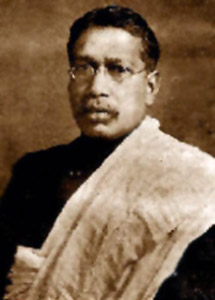Bipin Chandra Pal
Bipin Chandra Pal ( Bengali : বিপিন চন্দ্র পাল , Bipin Candra Pāl ; born November 7, 1858 in Sylhet ; † May 20, 1932 in Kolkata ) was an Indian teacher , journalist , speaker, politician , librarian and author .
Life
Bipin Chandra Pal was born as the only son of a wealthy Hindu Kayastha family in a village in Sylhet . His father was Ramchandra Pal.
After initial training with a Maulvi in Sylhet , he attended Sylhet Government High School before moving to Presidency College , which he left before his exams. Yet he was remarkably well-read, having studied the Gita and the Upanishads extensively.
He worked from 1879 as the principal of a high school ; a position he kept at several different schools in and around Sylhet. In the public library of Kolkata he worked temporarily (1890-1891) as a librarian and secretary. In 1891 he supported the new law on marriage , which was supposed to curb child marriage .
Surendranath Banerjea interested Pal in political issues and Pal quickly caught up with the group of "extremists" at the Indian National Congress who fought for Indian independence in the first half of the 20th century and who dedicated their lives to this goal. This group also included Lala Lajpat Rai , Bal Gangadhar Tilak and Aurobindo Ghose . Because of their leadership trio, the group became known as Lal-Bal-Pal . However, he did not share Tilak's Hindu nationalism. The party conferences of the Congress Party in 1886 in Kolkata and 1887 in Madras , he demanded that Congress may be of poor treatment of plantation workers in the tea plantations of Assam accept.
In 1898 he went to England for the first time to study comparative religion for a year . After his return he was committed to the goal of Indian self-government, swaraj , in the weekly newspaper New India and took over the chairmanship of the party congress of the Indian National Congress in 1904 in Bombay . When Viceroy Lord Curzon ordered the partition of Bengal in 1905 , Pal responded by founding a daily called Bande Mataram , whose editor he was, and against the weakening of the growing Bengali influence intended by the British colonial administration through the tried and tested model of "divide and rule" with mass protests agitated. Bande Mataram (Eng. "Bow down to your mother") was a famous poem by the Bengali Bankim Chandra Chattopadhyay , which became the informal national anthem .
The extreme nationalists advocated extreme means to back up their calls for a British withdrawal, such as boycott of British factory products, the incineration of western clothing from Manchester's factories, and strikes and boycotts of British shops and industrial groups.
Pal made contact with important Bengali personalities such as Keshab Chandra Sen and Sivanath Sastri and joined the Brahmo Samaj . His refusal to testify against Arabinda Ghosh at the trial of the Mataram group charged with sedition earned him six months in prison. After his release in 1908, he went into exile in England for three years . In 1919 he traveled to Great Britain for the third time with other eminent Indian politicians such as Annie Besant and Tilak at the head of the All India Home Rule League . The India Home Rule League demanded the status of a self-governing Dominion in the British Empire for India, similar to the status of Canada , New Zealand and Australia . Pal also knew America firsthand.
In 1921 he took over the chairmanship of the Bengali Provincial Conference in Barishal . He rejected Gandhi's campaign of non-cooperation as a mass movement of civil disobedience because of his support for the caliphate campaign . From 1925 he withdrew from active politics.
Pal was married to the Brahmin widow Nrityakali Devi. After her death, he remarried another Brahmin widow, Birajmohini Devi, a distant relative of Surendranath Banerjea. His son Niranjan Pal (1889-1959) worked as a screenwriter and director for Indian film from the 1920s.
journalism
Pal was active as a journalist and author for a long time: in 1886 he began working as a dedicated journalist in Sylhet for the Bengali weekly newspaper Paridarshak . In 1882 he became co-editor of the Bengali Public Opinion , and in 1887 he moved briefly to the Lahore Tribune to also serve as editor for The Democrat and The Independent . In 1887 he even published a biography of Queen Victoria in Bengali . In 1902 he worked for the weekly newspaper New India before he founded the weekly newspaper Bande Mataram in 1905 , as its editor he acted again.
Works
- Indian Nationalism
- Nationality and Empire
- Swaraj and the Present Situation
- The Basis of Social Reform
- The Soul of India
- The New Spirit
- Studies in Hinduism
- Queen Victoria (biography)
Web links
| personal data | |
|---|---|
| SURNAME | Pal, Bipin Chandra |
| BRIEF DESCRIPTION | Indian journalist, author, politician |
| DATE OF BIRTH | November 7, 1858 |
| PLACE OF BIRTH | Sylhet |
| DATE OF DEATH | May 20, 1932 |
| Place of death | Kolkata |
